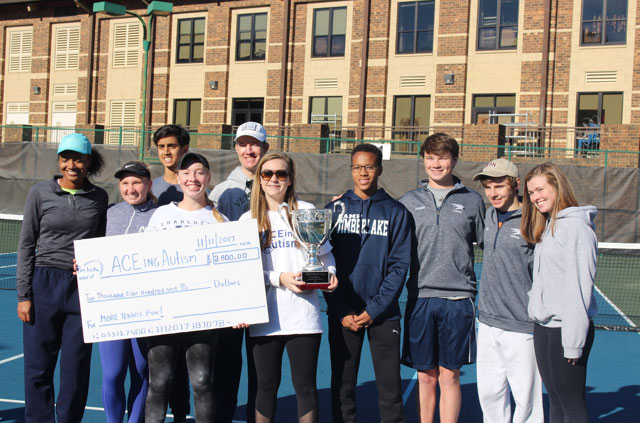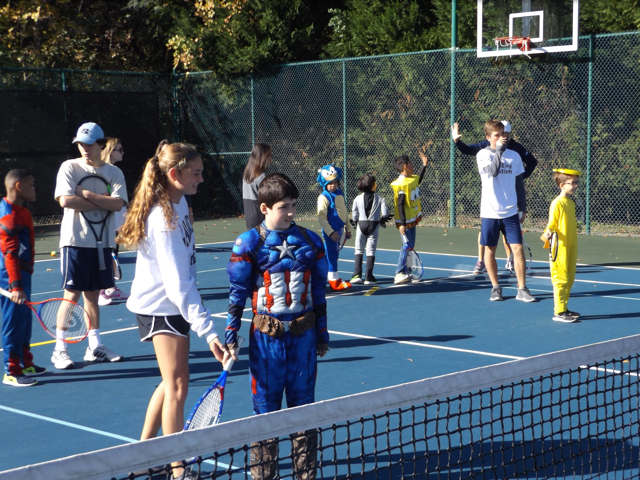ACEing Awareness: Tennis Becomes More Than Just a Game for Those with Autism
May 9, 2018
Anna Catherine Henley, the Charlotte Latin student director ’19, recalled one of her experiences coaching a participant in the ACEing Autism program and the impact her mentorship has had on one young child.
“I was partnered with this little girl who had a rough time during the first clinic, but each week she drastically improved. I will never forget the hug she always gave me at the end of each clinic and her face after her first backhand,” Henley said.
The tennis program functions to challenge the children appropriately, even if they might become frustrated at first before they triumph and master the skills.
ACEing Autism serves as both a tennis program and a developmental program for children with autism. Through learning to play tennis and having human interactions, the participants learn life skills that enhance their communication, brain growth and concentration. Justin Belisario, Director of Programs, analyzed that “94% of parents cited improvements connected to their child’s participation in ACEing Autism.”
“Our mission is to connect children with autism through unique tennis programs, and to develop and advance proven methods to positively impact the children, families and communities we serve,” Henley said.
According to the ACEing Autism website, Richard Spurling and Dr. Shafali Jeste established the program in 2008 in Boston, Massachusetts. They introduced their first program at The Longfellow Club in Wayland, Massachusetts with fifteen children. The idea of playing tennis emerged through the collaboration of Richard Spurling and Dr. Shafali Jeste.
“Richard Spurling and Dr. Shafali Jeste founded the organization when Dr. Jeste found that there was a lack of recreational programming for her patients. Since Spurling was a tennis professional and entrepreneur, they decided to bring their interests together to create the organization,” Belisario said.
Dr. Shafali Jeste received her MD from Harvard Medical School and studies behavioral child neurology and brain development. She gives her life to helping children and understanding autism. (http://aceingautism.org/profile/shafali-spurling-jeste/)
Automatically, the design of the game of tennis inspired participants to learn, try new things, stray from their comfort zone and have fun.
“ACEing autism creates a fun-loving and encouraging atmosphere,” Henley said. “ACEing Autism is a great opportunity to help others while doing my favorite sport. After the first clinic, I had so much fun interacting with the kids and teaching them tennis that I could not wait to volunteer again.”
Tennis helps children find a passion and try new things.
“Our goal is to connect kids through tennis. We strive to introduce the sport of tennis to children on the autism spectrum and their families,” Belisario said.
ACEing Autism is only just beginning and the program expects to grow and has a ton of potential.
The ACEing Autism website indicates that their vision is “to grow the number of participants on an annual basis across the U.S. to 4,500 by the end of 2021 and overseeing 80-90 program sites throughout the U.S.”

Belisario chose to get involved in this developing program for many reasons. He oversees 50 programs in 24 states.
“I wanted to be a part of ACEing Autism because I have a medical background and my cousin is on the spectrum. I also played tennis in college and knew this would be a good fit,” Belisario said.
Their vision is to expand the program to 4,500 participants and stretch across the US with over 80 locations in the next 3 years. (http://aceingautism.org/about/)
“Each and every day ACEing Autism is serving more kids and adding more programs across the country. The Charlotte program is expanding to hold clinics for ages 4-10 and for the first time 11-18,” Henley said.
The ACEing Autism website provides insight of the accomplishments the organization shared in 2017, such as 23 new programs made and 951 registrations were affirmed. Moreover, 812 hours of tennis was played, the program registered 1136 volunteers, and 78 scholarships were given.
“Hopefully in ten years, we are in every major city and giving access to all individuals regardless of age,” Belisario said.
Harvard researchers guess that the additional costs of needs, healthcare and education for those with autism cost more than $17,000 per child annually. Since this is a huge expense for the families, there is not room for other activities and their cost.
(https://www.autismspeaks.org/science/science-news/costs-autism-study-tallies-kids’-higher-health-and-education-needs).
“With the help of volunteers, ACEing Autism brings forth an affordable recreational program for these families,” Henley said.
This program impacts the lives of the volunteers and the children.
“ACEing Autism has allowed me to carry out my passion for helping others as well as opened the doors for leadership opportunities,” Henley said.
The kids have a tendency to think they cannot achieve the skills because they are so used to not being able to do “normal” things. ACEing Autism focuses on changing those mindsets and gradual improvement.

“This program has been eye-opening because I do not focus on what people can’t do but rather what they are capable of achieving,” Belisario said.
After they practice and receive personal feedback, the children get the hang of the motions and challenge themselves.
“My favorite memory was seeing a child who barely could hold a racquet on his own during the first clinic transform to hitting volleys independently and having fun,” Belisario said.
The most rewarding part of ACEing Autism is watching the participants enjoy their time and laugh.
“I love seeing the smiles on the children’s faces and the satisfaction that parents gain from learning through the sport of tennis,” Belisario said.
There are many ways to get involved with ACEing Autism, and it is a great service opportunity. Upcoming sessions and volunteer opportunities:
Spring Session Dates and Times: 5/12, 5/19; 9-9:50am ages 4-10, 10-10:50 a.m. ages 11-18. (Location: Charlotte Latin School tennis courts)
From frustration to triumph. ACEing Autism provides kids with an exhilarating and exciting feeling as they learn the skills of tennis, but more importantly the skills of life.
